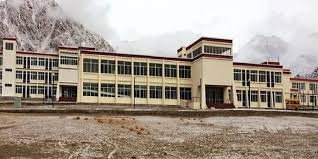LEH, July 23, 2025 – Sindhu Central University, the world’s highest-altitude university located at approximately 3,500 metres above sea level, has officially launched its transit campus, marking a significant step in establishing Ladakh’s first central university.
The temporary academic facility was inaugurated on Sunday by Prof. V. Kamakoti, Director of IIT Madras and Chair of the Executive Council of Sindhu Central University. This transit campus will function as the university’s academic hub until construction of the 110-acre permanent campus in Khaltsi village, situated between Leh and Kargil, is completed—expected within 36 working months.
A Gateway for High-Altitude Research
Speaking at the inauguration, Kamakoti highlighted Ladakh’s strategic potential for scientific advancement.
“India often talks about sustainable development through deep-sea research. Now, with a university at this altitude, we have an opportunity to lead high-altitude research in atmospheric science, climate studies, environmental sustainability, and renewable energy,” he said.
He also underscored the region’s unique cultural landscape:
“Surrounded by Ladakh’s rich Buddhist heritage, this university opens the door for interdisciplinary scientific and cultural research.”
IIT Madras as Mentor Institute
IIT Madras is mentoring the university and supporting academic programmes in collaboration with other premier institutes like IIT Kanpur. Initial offerings include:
-
MTech in Atmospheric and Climate Science (IIT Madras)
-
MA in Public Policy (IIT Madras)
-
MTech in Energy Technology and Policy (IIT Kanpur)
Tailored Curriculum for Ladakh
Dr. Sachin S. Gunthe, Faculty Coordinator and IIT Madras faculty member, stated that the university is developing a context-driven curriculum suited to Ladakh’s needs.
“We’re designing organic, region-specific academic programmes. The aim is to offer courses that reflect the environmental and socio-cultural realities of Ladakh,” he said.
The university is also working to establish collaborative partnerships with six national research institutions and plans to integrate advanced medical infrastructure to serve the local population in future phases.
A Vision for the Future
Named after the ancient Sindhu (Indus) River, Sindhu Central University is also India’s first trans-Himalayan central university. Once fully operational, it is expected to become a hub for innovation, sustainability, and indigenous knowledge systems, contributing significantly to India’s scientific and educational growth.



















